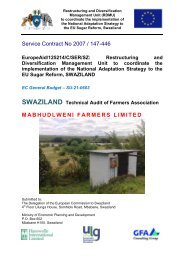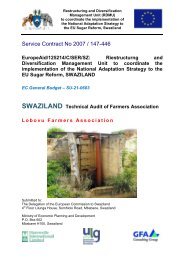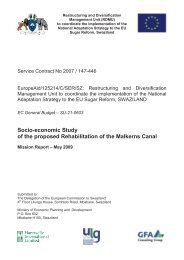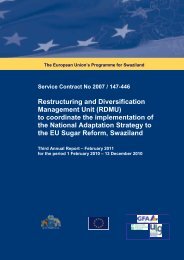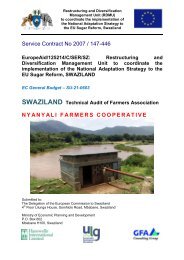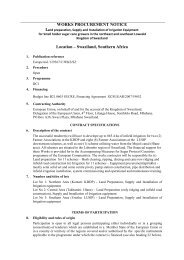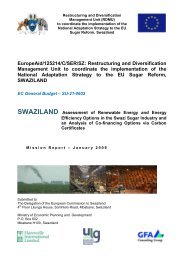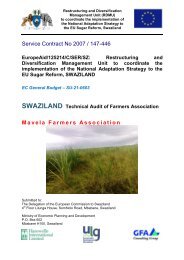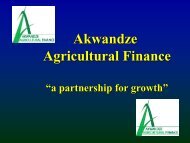Service Contract No 2007 / 147-446 Strategic ... - Swaziland
Service Contract No 2007 / 147-446 Strategic ... - Swaziland
Service Contract No 2007 / 147-446 Strategic ... - Swaziland
- No tags were found...
Create successful ePaper yourself
Turn your PDF publications into a flip-book with our unique Google optimized e-Paper software.
- Farmer Association Business Model. The model is used in both KDDP and LUSIP inwhich farmers are required to pool together their land parcels into a group, and begiven an equal share in the association (despite the original land size not being thesame for each member). The following points have been raised against the model:ooooThe shareholding of the members not equated to the amount of landcontributed by the respective farmer (‘pool’ land for reallocation based onequal share);Lack of choice as to who forms the FA, given that it is based on the location ofthe landholding (farmers cannot choose with whom to associate in the group,there may not be good ‘neighbourliness’ and conflicts may arise);Problems in employer/employee relationships given the confusion of the rolesof being an employee of the association and a shareholder at the same time;The need for the FA to be run much like a business, requiring an effectivemanagement body and the employment of skilled and un-skilled people,rather than a developmental poverty alleviation scheme.- Increasing Farmer Indebtedness. Farmers often take loans for the initial capitalinvestment into the installation of irrigation equipment and for annual ratoonmanagement. The poor performance of the FAs and high interest rates means thatalmost the entire sucrose proceeds are taken by the financier to cover the loaninstalment. This creates a vicious cycle whereby the FAs find themselves requiringfinancial backing to keep their farm sustainable. The non-sharing of dividendsamongst the members in the project despite the high capital outlay become a majordemotivating factor for the farmers. This challenge may force some FAs out of caneproduction.- Tax requirements. These are placing an additional financial burden on farmers andagain impacting on profits.- Unrealistic Business Plans. The initial business plans for smallholder developmentsdid not factor in realistic projections on the increase in costs, such as for electricityand fuel, both in the medium- and long-term. Over and above all, the current businessplans do not cater for provision of replacements. Linked to this are weak financialmanagement systems and procedures, resulting in little control over income andexpenditure.- High Input Costs. The running costs, particularly for energy and transport, dependlargely on distance, either from the water source (electricity required for pumping), orto the sugar mill (haulage for the cane). Equipment in use by smallholders is allegedlyenergy-inefficient, adding to electricity costs. As with the price of fuel, the price ofelectricity has increased substantially, and <strong>Swaziland</strong>’s dependency on electricityfrom South Africa generates uncertainty around price stability. Many smallholdershave not taken up the Time of Use Tariff offered by the <strong>Swaziland</strong> ElectricityCompany (SEC) to optimise their energy usage during off-peak periods. This is inpart due to the nature of irrigation – irrigation can take place 24 hours a day.- The lack of Technical Capacity and Training. This is not only for irrigated farming (andsugar as a cash crop), but for irrigation and business management, required on abroad level and not only for particular individuals. The use of various trainersfollowing their own training programmes has led to some confusion within FAs.- Limited Extension Support <strong>Service</strong>. This is provided by the MOA, SWADE and thesugar mills. Although the extension service is perceived to be of good quality; it is notRDMU (<strong>Strategic</strong> Environmental Assessment of the National Adaptation Strategy) - Page 54



